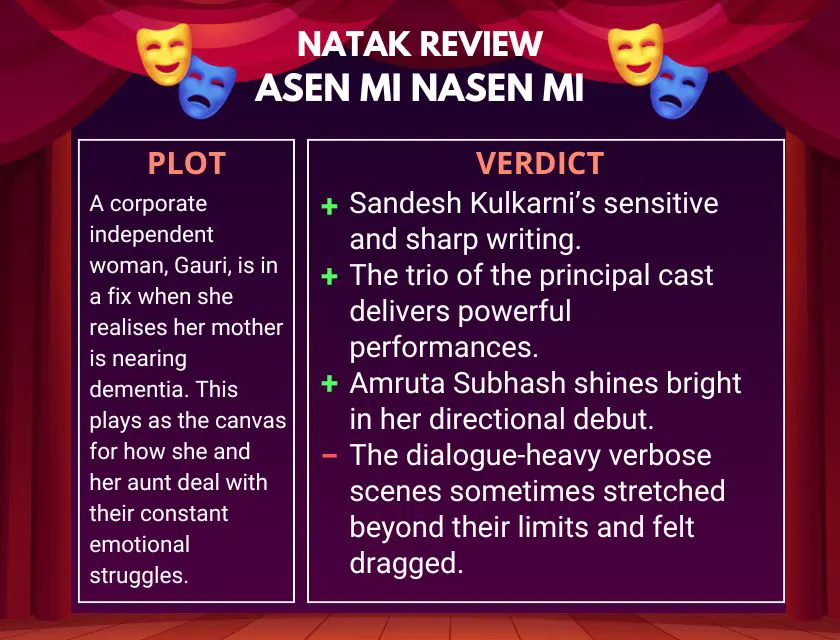Asen Mi Nasen Mi Natak Review:
Rating:
Plot:
A corporate independent woman, Gauri, is in a fix when she realises her mother is nearing dementia. This plays as the canvas for how she and her aunt deal with their constant emotional struggles.
Team:
Director:- Amruta Shubhash
Writer:- Sandesh Kulkarni
Set Design and Lights:- Pradeep Mulye
Music:- Saket Kanetkar
Costumes:- Shweta Bapat
Cast:- Amruta Subhash, Neena Kulkarni and Shubhangi Gokhale
Asen Mi Nasen Mi Natak Review:-
The NSD graduate who shone brightly on the acting canvas, turning whatever she touched into gold, also bagging a National Award on the way, Amruta Subhash finally steps into the director’s shoes, making her debut with Asen Mi Nasen Mi. The script is beautifully penned by another veteran, Sandesh Kulkarni. A sensitive look at how Marathi women make homes out of houses, the play deals with the themes of womanhood, loss and ageing.
The first act starts with Aai (Neena Kulkarni) hallucinating her long-dead husband as her memories keep haunting her every moment. Then, we are introduced to her workaholic daughter, Gauri (Amruta Subhash), who herself is struggling to hold the multiple ropes of her family, pulling her apart emotionally. This melancholic relationship between the two is sprinkled with spirit by Aai’s sister Varsha (Shubhangi Gokhale).
We get a look at this brittle yet comfortable household structured around these three women as slowly the unsaid complex emotions start surfacing. All of this is also dealt with shock when Gauri starts recognizing the symptoms of dementia in her mother’s habits. Meanwhile, Gauri struggles to disclose her wish to divorce her husband. How the three pillars keep balancing the constantly rising emotional complexities and keep the home intact is how the play moves forward.
The extremely sensitive writing by Sandesh is the biggest plus point, which keeps the play miles away from being the same old kitchen-sink Marathi drama. The way he pens death lingering around while you laugh along with life just shakes you beyond expectations. This beautiful writing is deservedly brought to life by Amruta Subhash’s nuanced direction. The way she slowly slides in emotional highs and makes us comfortable with the grave circumstances is simply gorgeous. For example, there is a dialogue taken by Gauri which mentions killing herself with the thin and sharp hairs of her mother is juxtaposed with her mother’s habit of disposing her falling hair every day. The play right from the start makes you feel at home as if watching your household unfold in front of your eyes. With so much emotional turmoil going on, there is a high chance you might cry so keep your tissues handy. Some of the subtle deliveries are gut-punching and instant tear jerkers. The dialogue-heavy verbose scenes sometimes stretched beyond their limits and felt dragged. One particular angle which deals with the dead husband lingering around was something which put me off and feels unnecessary.
Neena Kulkarni’s performance as a strong-headed yet vulnerable ageing woman is a testament to her acting prowess. She is so good that at one point, you will feel like getting out of your chair and helping the woman suffering from dementia. Most of the scenes in the first half are designed around her being alone on the stage, and she carries them powerfully without any slack. Amruta Subhash’s reactions become the core of her character. She laughs, she cries, she is scared, frustrated, lonely, ambitious, caring and makes you feel all of this at once as well. Shubhangi Gokhale plays two characters in the play and both are inherently different. Yet she leaves a mark on both of them. The music by Sanket Kanetkar brings out the tranquillity required in some scenes effectively. The Set Design seems perfect for a living room drama.
What makes Asen Mi Nasen Mi particularly memorable is its ability to resonate with the audience long after the curtains fall. It challenges perceptions and leaves you pondering the essence of existence and the choices that define us. Whether you’re a connoisseur of Marathi theatre or a casual viewer, Asen Mi Nasen Mi is a must-watch for its thoughtfulness, complexity, and emotional turmoil hidden in our households. This play is a testament to the power of storytelling in exploring the complexities of human life.




